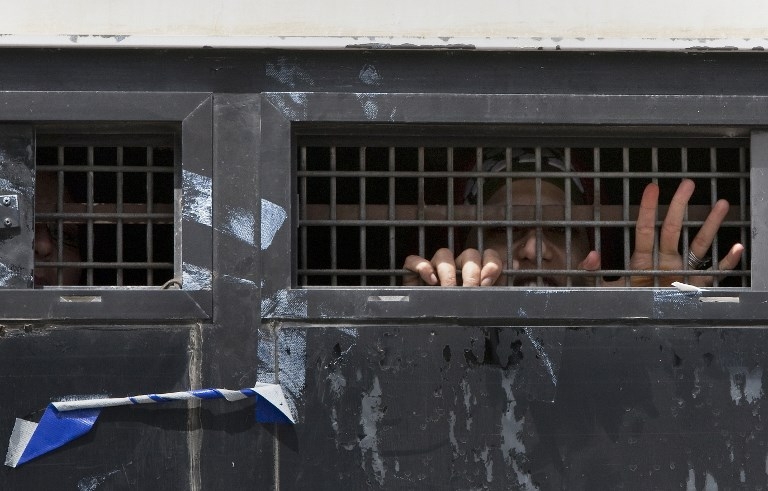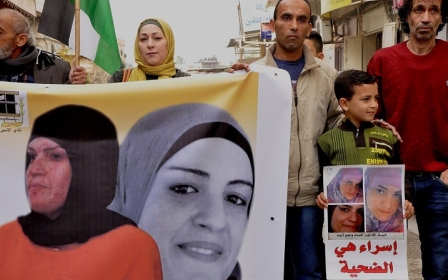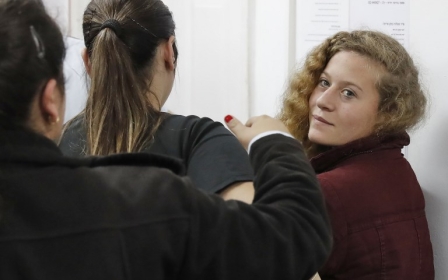Israel’s prison excursion: A journey of unspeakable misery

The misery begins when a prison officer briskly announces that one of the jailed women will be going on an “excursion”. From that moment onwards, all are wrought with worry.
This “excursion” is not a touristic expedition or a pleasant stroll, but a journey of relentless anguish and fatigue. Its impact lingers for weeks, and sometimes even years. This is what it means to travel in the Israeli prison transfer vehicle known as the bosta.
Most female Palestinian prisoners are held in Hasharon prison, near Jaffa, or Damon prison, at the foot of the Carmel forests in Haifa. Depending on their place of residence, the women are brought to trial at the Ofer or Salem military courts, or the Jerusalem city courts.
Although the length of historic Palestine, from the northernmost point to the southernmost tip, can be traversed in six hours, bosta journeys can span three or more days. A prisoner serving less than a year in jail might make the trip a handful of times, while those serving longer sentences might have to endure it more than a dozen times.
The ultimate humiliation
Whenever the topic of court comes up, prisoners ask God to ease the fatigue that the next victim is bound to experience during the bosta journey. They deliver endless supplications to spare the prisoner from being strip-searched before boarding.
The anguish caused by the bosta experience seems far greater than the distress caused by the charges, trial and ultimate sentence. As soon as a prisoner is informed of her next court date, she immediately anticipates the hardships of the journey. Once the final judgment is delivered, on her return to prison, she finds herself involuntarily thinking: “This is my penultimate bosta.”
I thought of all the prisoners left behind, with whom I had shared so many days and nights behind the barbed-wire fence. Countless tales of pain and anguish were buried inside this cement structure
The astonishing inhumanity of this “excursion” resembles the experience of hell.
Bosta journeys are carried out at the hands of an Israeli unit called the Nahshon, whose members are known for their strong physiques, gruffness and apparent desire to humiliate the prisoners in their care. The women must endure sitting on a cold, narrow metal seat for 12 or more hours at a time, resulting in chronic back pain for many.
For prisoners from Damon, the prelude to the bosta journey typically begins at around 8am on the day before court. Women are led out to waiting rooms to be searched - either a routine frisking or a full-body strip search, depending on the mood of the Nahshon. The strip search is the ultimate abuse, an infringement on the sanctity of any human being.
Concealing prayer beads
Afterwards, the prisoner’s hands and feet are shackled before she is guided to the bosta. No food or personal items are permitted on board - not even a set of prayer beads. Some prisoners wrap the beads around their wrists to disguise them as bracelets, in order to sneak them on board.
Many detainees have even been banned from bringing the Quran, forced to leave the holy book with a member of the Nahshon until the end of the journey.
The bosta generally departs at around 9.30am from Damon prison and heads towards a central station where all prisoners from the northern district are gathered. During this time, prisoners might have to wait a further four or five hours inside the bosta, where they sit shackled in tiny, individual metal cages. No concessions or exceptions are made for the sick or wounded.
In addition to the physical distress, this gruelling journey affects women’s mental health, both through the humiliation inflicted upon them by the Nahshon and through racist slurs hurled by Jewish Israeli detainees aboard the bosta.
My lost country
One of my own hearings took place on 15 June 2016, during the holy month of Ramadan. A prisoner friend had concealed a couple of dates in her pocket, which we shared to break our fast while waiting for the bosta vehicle to depart from the Ofer military court.
When it was time for the call to prayer, a male prisoner - men travel on the same vehicle but in a separate area - stood up to deliver it, the call ringing out from his cage. “God only knows if he has anything to break his fast with,” my friend lamented. My heart aches when I recall this.
The day I was released from prison, my hands and feet were shackled as I boarded the bosta for my final journey. The only thing that eased the anguish of the trip was knowing it would be my last. As we left Haifa and headed towards the Jalma checkpoint north of Jenin, I saw, for the first time, the whole of the prison exterior. It was oppressive, repulsive. I thought of all the prisoners left behind, with whom I had shared so many days and nights behind the barbed-wire fence. Countless tales of pain and anguish were buried inside this cement structure.
An hour passed as I stared out from the bosta at my looted land. I stole fleeting glances at Haifa’s sea, like someone dying of thirst, hoping a few drops of water would bring salvation. Hot tears stung my eyes - tears of oppression and grief, of someone who has for the first time seen her lost country while she sits shackled.
All of this is but a snapshot of the agony inflicted by the bosta - a mere drop in an ocean of anguish.
- Salam Abu Sharar is a Palestinian pharmacist, activist and blogger.
The views expressed in this article belong to the author and do not necessarily reflect the editorial policy of Middle East Eye.
Photo: A detained activist is seen inside an Israeli police bus near Tel Aviv in June 2010 (AFP)
New MEE newsletter: Jerusalem Dispatch
Sign up to get the latest insights and analysis on Israel-Palestine, alongside Turkey Unpacked and other MEE newsletters
Middle East Eye delivers independent and unrivalled coverage and analysis of the Middle East, North Africa and beyond. To learn more about republishing this content and the associated fees, please fill out this form. More about MEE can be found here.






